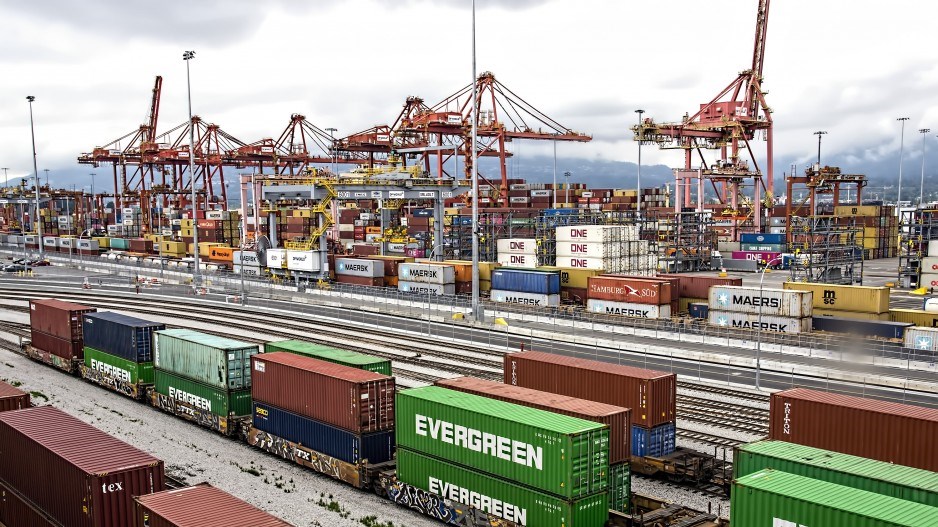B.C. dockworkers and maritime employers have rained on Canada Day parades across the province and the rest of the country after failing to reach an agreement on a new contract last night.
Unionized port workers have consequently began setting up picket lines Saturday morning at key maritime cargo terminals along the Port of Vancouver waterfront and elsewhere.
The job action came despite the Thursday night arrival in Vancouver of federal Minister of Labour Seamus O’Regan and the involvement of Federal Mediation and Conciliation Service (FMCS) mediators.
It also comes at a critical time in a global economy teetering on the edge of inflation and a downshift in transpacific trade.
The failure to secure on a new long-term contract in B.C. comes despite the tentative agreement reached in June on a six-year deal between the Pacific Maritime Association (PMA) and the 22,000 unionized dockworkers employed at 29 ports along the U.S. West Coast.
It also ignores the gloom gathering over global economic outlooks and the steady downshift in shipping demand on the transpacific and other major trade corridors.
And the job action threatens to quickly undo the rebuilding of West Coast B.C.’s reputation for cargo reliability that has been underway during the previous five- and eight-year contracts between International Longshore and Warehouse Union Canada (ILWU) and the BC Maritime Employers Association (BCMEA).
Vancouver’s port reliability suffered badly in the 1970s, when there were lengthy longshore labour disruptions, and again in the late 1990s when employers locked out the ILWU.
More recently it took it on the chin from pandemic economy volatility, coupled with wildfires and flooding, which proved to be a generational disruption from which the port has yet to fully recover.
The recent release of the 2022 Container Port Performance Index (CPPI) underscores that struggle. The index, released by the World Bank Group in co-operation with S&P Global Market Intelligence, measures and compares major global ports’ container cargo handling efficiency based on the overall in-port time of container ships.
The third annual compilation of the CPPI ranks Vancouver 347th out of the 348 major global ports included in the index compiled based on 2022 data. That is one rung lower than its ranking in the 2021 index.
Add into all of the above the down bound direction of North America’s economy.
Freightwaves founder and CEO Bob Fuller provided some concerning shop floor insights on that direction during the global supply chain market intelligence company’s most recent State of Freight update.
He said the market today “is as opaque as it has ever been.... The mainstream economy that we care about, the goods economy, is incredibly bearish. And there are a lot of reasons to continue to be bearish.
Those reasons range from “consumer spending that is starting to get tapped out” to major retailers mired in inventory gluts accumulated during the pandemic economy panic.
Fuller added that the housing market downturn, rising inflation and ongoing interest rate hikes have combined to stall sales of building supplies, furniture, appliances and other major consumer goods.
That all bodes ill for trucking companies and other key links in the North American supply chain.
Meanwhile, global maritime container trade volumes dropped by 3.7 per cent in 2022 compared with 2021, and guidance from major ocean carrier companies such as Denmark’s Maersk (CPH:MAERSK-B) see growth in the global container market drifting in the range of minus-2.5 per cent to a tepid plus-0.5 per cent.
The migration of transpacific container cargo traffic away from the West Coast to competing ports in Mexica and through the Panama Canal to ports on the Gulf and East coasts has continued to accelerate.
However, low water levels in the Panama Canal caused by a persistent drought could slow that migration this year.
If the current port labour dispute in B.C. is not resolved soon, the province and the rest of the country will miss out on that opportunity to lure more cargo north.
It is also cause for concern for economies outside of Canada.
As American Trucking Association president and CEO Chris Spear stated June 29, the news of the imminent strike at Canadian West Coast ports “is unwelcome news for the U.S. economy as the global supply chain enters peak shipping season. This is a serious situation that demands serious leadership.”
Cruise ship operations in the Port of Vancouver will not be affected by the strike action.
According to the BCMEA, both parties in the dispute have confirmed that through the FMCS process cruise ships will continue to be serviced in Vancouver, Prince Rupert and on Vancouver Island.
O'Regan said in a Canada Day statement that federal mediators continue to support both parties in their negotiations.
"We cannot emphasize this enough," he said, "the best deals for both parties are reached at the table."
twitter.com/timothyrenshaw




